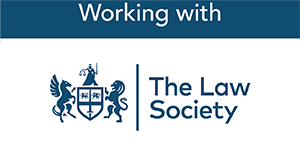AML Compliance
for Solicitors and Law Firms

Protect your business from crimes and fines
Money laundering costs the UK an estimated £100bn annually*
* Source: Cutting The Costs of AML Compliance Report – LexisNexis® Risk Solutions
As a key target of money launderers, legal sector firms face significant pressure to demonstrate they’re taking extensive measures to counter financial crime.
LexisNexis® Risk Solutions – a long-standing affiliate partner of the Law Society – can help protect your firm from the lasting reputational damage associated with a regulatory breach, whilst also speeding up client onboarding through more effective anti-money laundering (AML) checks.
4 of the top 5
UK Law Firms*
* As of September 2022
11/20
Law Firms*
* As of September 2022
47 of the top 100
Law Firms*
* As of September 2022
Leading UK firms trust LexisNexis® Risk Solutions to screen all clients and associated parties against:
Global Sanctions
Politically Exposed Persons (PEPs)
Adverse Information
Enhanced Due Diligence Data
"The legitimate services and reputation of the legal sector offer an attractive proposition to criminals with cash to invest… there is a very real risk and firms need to be cognisant of that risk when conducting CDD."
Head of Anti-Money Laundering – Law Society Scotland
What are your Customer Due Diligence OBLIGATIONS?
Your CDD must be robust, risk-based and evidenced. Simply taking copies of your customer’s ID documents is not enough to mitigate the risk of money laundering. It is also unlikely to satisfy your regulator.
A clear understanding of the risks associated not just with the client but also the matter they are instructing you on, is essential. There are several key activities that your CDD should incorporate:
Identity verification
Criminals can easily source forged ID documents or manipulate genuine ones. Confident verification of identity requires multi-layered checks that utilise a variety of independent tools and sources. In addition to verifying the client, you should also confirm the identity (and assess the risk) of any associated beneficial owner.
Risk assessment
Risk associated with clients should be assessed on an ongoing basis, not just at point of onboarding. Are they politically exposed? Are they sanctioned? These are risks that evolve over time and should be monitored continually.
Understanding the purpose and nature of the relationship or transaction
Why does the client want to carry out the transaction? Does the activity meet their known business profile? What is the source of funds to be used? You should only engage when you are happy the above factors point to a legitimate transaction.
Ongoing monitoring
Risk changes over time and today’s low risk instruction, can become tomorrow’s high risk exposure. CDD is not a ‘one and done’ scenario; ongoing monitoring of client relationships is critical.
To help you conduct CDD that is both effective and customer friendly, LexisNexis® Risk Solutions offers a unique combination of technology, data and advanced analytics that will help you to quickly establish the risk associated with prospective clients.
CRITICAL INTELLIGENCE to support your AML compliance
Comply with regulations, with minimal impact to your clients and business.
Save time, improve efficiencies, focus on your business
Meeting your AML obligations should not be an onerous task, nor should it impact on your revenue-generating activities. LexisNexis® Risk Solutions can help to ensure this is the case: our proprietary technology and data will help you to identify and manage money laundering risk at the first possible opportunity.
Know your client – even when they’re not present
Supporting initial and ongoing customer due diligence (CDD), our range of AML solutions will help you to authenticate client identity, flag potential high risk entities (such as individuals who are Politically Exposed Persons, or under Sanctions) and conduct enhanced due diligence. All of these activities can be conducted without the customer physically present, helping to ensure business efficiency and customer satisfaction.
Multiple access options
- Web App
Conduct checks via our intuitive, easy-to-use web app. - Mobile Identity Check App
Reduce customer friction with secure, remote identity authentication. - Batch
Screen high volumes of clients on a one-off or regular basis. - API
Integrate our solutions directly into your existing systems.
One stop for your AML needs
Complementing our advanced analytics and technology, we work with a variety of industry partners who provide AML consultancy solutions. If you need support with your AML processes, policies and controls, our partner network will be able to provide appropriate advice and guidance.
Identity Verification and Authentication
LexisNexis® IDU®
Know who you’re dealing with – a fundamental in AML regulation. LexisNexis® IDU® is a web-based identity management solution that enables multi-layered identity checks. IDU combines data from multiple credit bureaus with our proprietary collection of consumer records, to provide industry leading verification coverage of the UK population.
Delivered in tandem with a range of supplementary checks including ID document authentication (conveniently performed via our IDU Mobile App), email risk assessment and multi-factor authentication; IDU can be integrated seamlessly into your case management software, accessed via an online interface, or used on a batch screening basis. You can even empower your clients to verify their identity remotely, via our mobile app.
Reduce client reject rates
Tailor each check to the risk presented
Identify entities which require further investigation (PEPs, Sanctions)
Enable fee earners to process clients quickly
PEP and Sanctions Checks
LexisNexis® WorldCompliance™ Data
Assessing the level of risk a client and the given matter presents should be carried out both upfront, and on a continual basis. Supported by over 400 researchers, located across the globe, LexisNexis® WorldCompliance™ Data is updated 24/7, to help you identify higher risk entities such as Politically Exposed Persons (PEPs) and sanctioned parties. WorldCompliance Data can be accessed directly from within LexisNexis® IDU®, via our flexible screening platform, LexisNexis® Bridger Insight® XG, or through our enhanced due diligence investigation tool, LexisNexis Risk Management Solutions® – Global.
Identify PEPs, their family members, business partners and close associates
Flag State Owned Entities, identify parties subject to sanctions and reduce regulatory risk
Screen against multiple major sanctions watchlists (e.g. HM Treasury, OFAC and EU), via a single, consolidated view
Maintain an electronic audit trail of checks, to provide evidence of your due diligence
Ongoing Monitoring
LexisNexis® Bridger Insight® XG | LexisNexis® WorldCompliance™ Data
Due diligence is not a one-time event. In a fast changing world, risk profiles can evolve overnight and leave you potentially exposed. Applying a risk-based approach and screening your customers for any changes in circumstance, on a regular basis, will allow you to spot new risks as they happen. This requires two critical components – insightful risk data to flag changes, and intuitive and powerful technology to match your clients to such data.
LexisNexis® WorldCompliance™ Data provides in-depth and continually-updated watchlist screening data, collated by more than 400 researchers globally. Used in combination with LexisNexis® Bridger Insight® XG, our flexible screening technology that can be moulded to your business needs, it will help you to identify risk at the earliest opportunity.
Conduct ongoing monitoring of your client base
Flag PEPs, Sanctions, Adverse Media and Enforcements
Apply a risk based approach, tailored to departments, teams and even individual users
Reduce the need for additional support staff
Drive efficiencies by reducing the level of ‘false positive’ matches
Enhanced Due Diligence
LexisNexis Risk Management Solutions® – Global
When a situation presents a greater level of risk – such as dealing with a PEP or an entity from a higher risk jurisdiction, your team will have to undertake deeper due diligence. Not doing so exposes your organisation to financial crime and reputational risk, and could invite scrutiny from the regulator.
Our enhanced due diligence investigation platform – LexisNexis Risk Management Solutions® – is a powerful web-based investigation tool. Delivering a unique capability, it draws together UK consumer, UK and EU business, and global risk data via a single investigation platform.
In addition it allows you to request researcher-generated Enhanced Due Diligence Reports for the highest risk entities, globally.
Obtain a detailed view of the risk presented
Research the legitimacy of a transaction, and create an evidence trail
Identify and evaluate relationships between people, between businesses and between people and businesses
Uncover beneficial owners and the risk they present
Search the deep web for adverse information on a potential client
* National Crime Agency news release: Forty-two businesses have been identified as having potential compliance failings in customer checks, record keeping and identifying risk.
^ OPBAS - Anti-Money Laundering Supervision by the Legal and Accountancy Professional Body Supervisors: Progress and themes from 2019





























